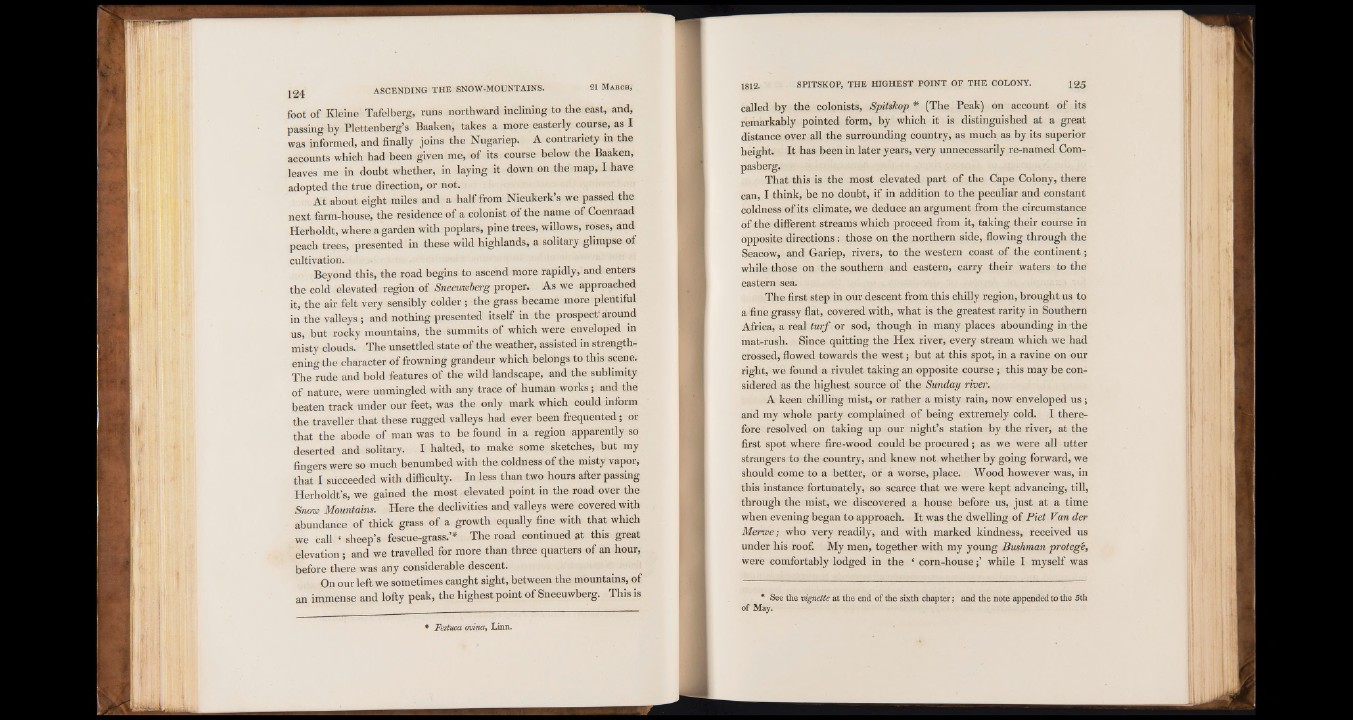
foot of Kleine Tafelberg, runs northward inclining to the east, and,
passing by Plettenberg’s Baaken, takes a more easterly course, as I
was informed, and finally joins the Nugariep. A contrariety in the
accounts which had been given me, of its course below the Baaken,
leaves me in doubt whether, in laying it down on the map, I have
adopted the true direction, or not.
At about eight miles and a half from Nieukerk s we passed the
next farm-house, the residence of a colonist of the name of Coenraad
Herholdt, where a garden with poplars, pine trees, willows, roses, and
peach trees, presented in these wild highlands, a solitary glimpse of
cultivation.
Beyond this, the road begins to ascend more rapidly, and enters
the cold elevated region of Sneeuwberg proper. As we approached
it, the air felt very sensibly colder ; the grass became more plentiful
in the valleys ; and nothing presented itself in the prospect around
us, but rocky mountains, the summits of which were enveloped in
misty clouds. The unsettled state of the weather, assisted in strengthening
the character of frowning grandeur which belongs to this scene.
The rude and bold features of the wild landscape, and the sublimity
of nature, were unmingled with any trace of human works ; and the
beaten track under our feet, was the only mark which could inform
the traveller that these rugged valleys had ever been frequented; or
that the abode of man was to be found in a region apparently so
deserted and solitary. I halted, to make some sketches, but my
fingers were so much benumbed with the coldness of the misty vapor,
that I succeeded with difficulty. In less than two hours after passing
Herholdt’s, we gained the most elevated point in the road over the
Snow Mountains. Here the declivities and. valleys were covered with
abundance of thick grass of a growth equally fine with that which
we call f sheep’s fescue-grass.’* The road continued at this great
elevation ; and we travelled for more than three quarters of an hour,
before there was any considerable descent.
On our left we sometimes caught sight, between the mountains, of
an immense and lofty peak, the highest point of Sneeuwberg. This is
# Festuca ovina, Linn.
called by the colonists, Spitshop * (The Peak) on account of its
remarkably pointed form, by which it is distinguished at a great
distance over all the surrounding country, as much as by its superior
height. It has been in later years, very unnecessarily re-named Com-
pasberg.
That this is the most elevated part of the Cape Colony, there
can, I think, be no doubt, if in addition to the peculiar and constant
coldness of its climate, we deduce an argument from the circumstance
of the different streams which proceed from it, taking their course in
opposite directions : those on the northern side, flowing through the
Seacow, and Gariep, rivers, to the western coast of the continent;
while those on the southern and eastern, carry their waters to the
eastern sea.
The first step in our descent from this chilly region, brought us to
a fine grassy flat, covered with, what is the greatest rarity in Southern
Africa, a real turf or sod, though in many places abounding in-the
mat-rush. Since quitting the Hex river, every stream which we had
crossed, flowed towards the west; but at this spot, in a ravine on our
right, we found a rivulet taking an opposite course ; this may be considered
as the highest source of the Sunday river.
A keen chilling mist, or rather a misty rain, now enveloped us ;
and my whole party complained of being extremely cold. I therefore
resolved on taking up our night’s station by the river, at the
first spot where fire-wood could be procured; as we were all utter
strangers to the country, and knew not whether by going forward, we
should come to a better, or a worse, place. Wood however was, in
this instance fortunately, so scarce that we were kept advancing, till,
through the mist, we discovered a house before us, just at a time
when evening began to approach. It was the dwelling of Piet Van der
Merwe; who very readily, and with marked kindness, received us
under his roof. My men, together with my young Bushman protege,
were comfortably lodged in the ‘ corn-house;’ while I myself was
* See the vignette at the end of the sixth chapter; and the note appended to the 5th
of May.